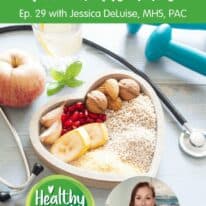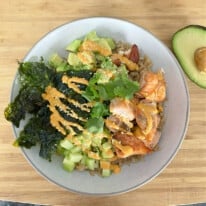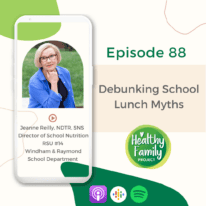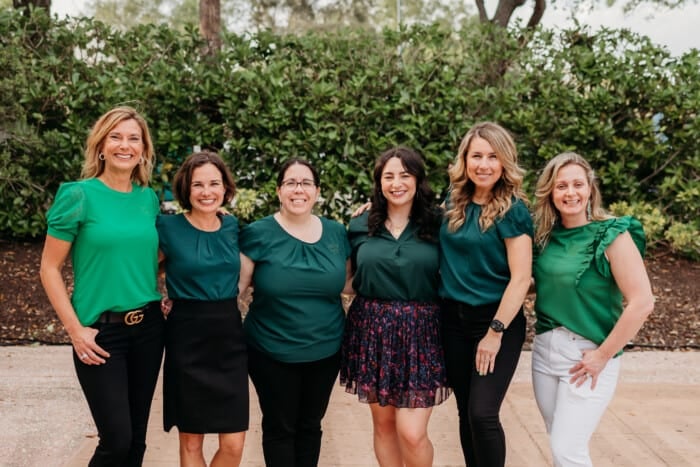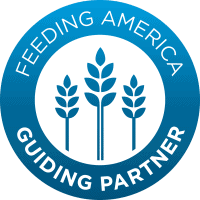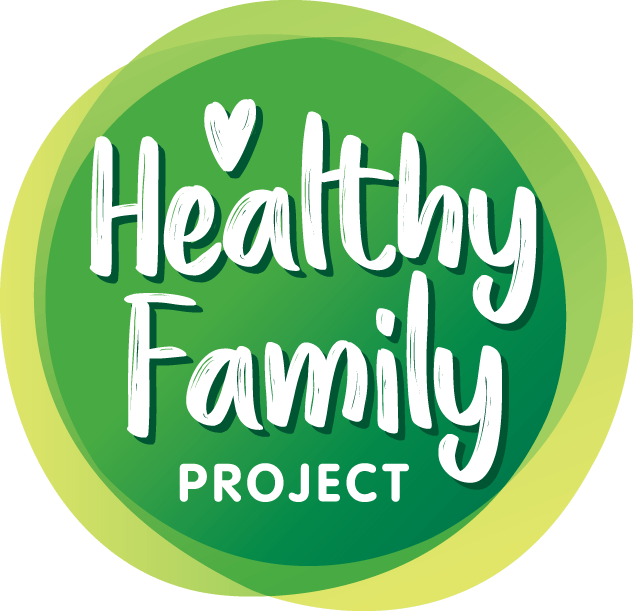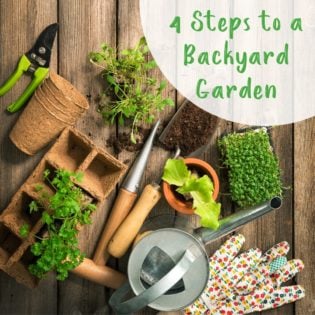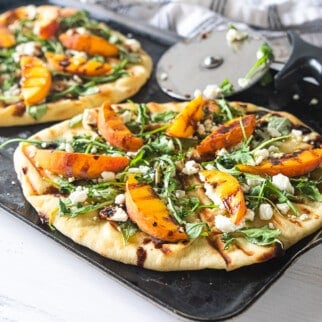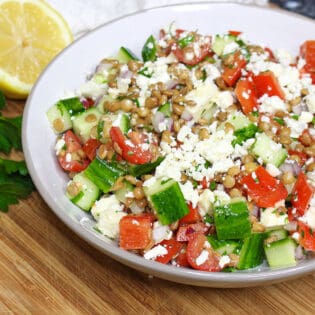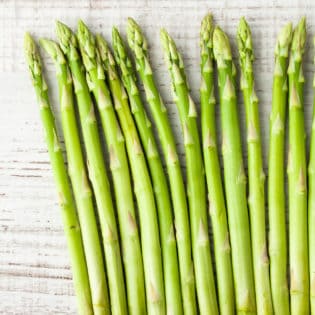Episode 29: Understanding Food as Medicine
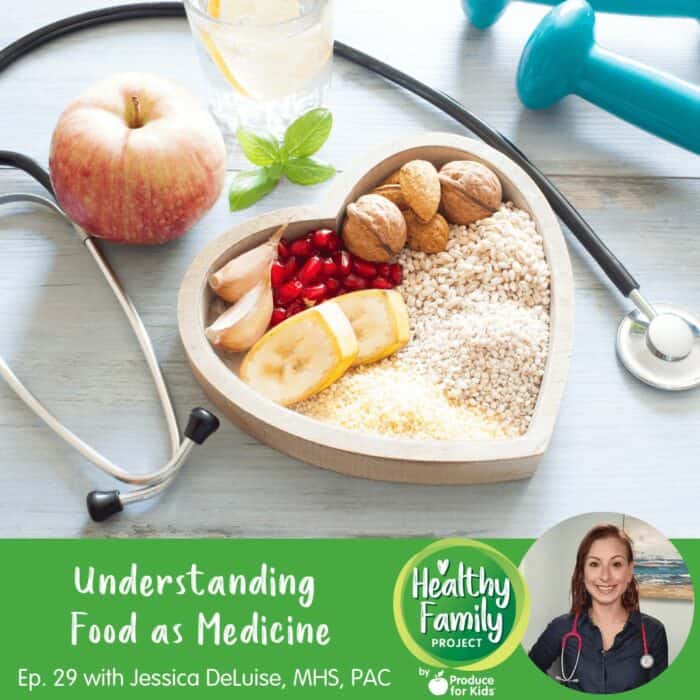
In this episode of Healthy Family Project, we talk to Jessica DeLuise, MHS, PAC, author of Eat Your Way to Wellness, on the importance of food and how it can positively or negatively affect our health and wellness.
Jessica uses her medical expertise to help explain the background behind this “Food as Medicine” movement in a way we can all understand. From inflammation to mood and anxiety, Jessica breaks down foods and actions that can help improve your health.
Jessica has a Masters degree in health science and practices as a medical physician assistant. Jessica is a certified culinary medicine specialist from Tulane University and is ServSafe certified for safe food practice.
She founded Eat Your Way to Wellness as a platform to educate and counsel clients. Food is the foundation for good health and by choosing quality ingredients and fueling your body with proper nutrition you can look and feel your best. More than that, Jessica wants to dispel the myth that “health food” is boring or bland.
Disclaimer: Before making any health or diet changes, please consult your doctor. The information shared in this episode is meant to be informative but not replace medical advice from your doctor.
Listener Survey!
Thank you so much for supporting the Healthy Family Project Podcast! We’d love it if you could take 5 minutes to let us know how we can bring you the best possible content for future episodes. Take the survey here.
Healthy Recipes & Tips in Your Inbox
Sign up for the Healthy Family Project e-newsletter to receive healthy recipe inspiration, our latest blog posts and more directly to your inbox each week.
Healthy Family Project Facebook Group
Join our Healthy Family Project Facebook group! This group will serve as a safe space for parents and caregivers to talk all about raising a healthy family – from dealing with a picky eater and tips to get more fruits and veggies onto plates to exercising as a family and mental health. We welcome all of you to join in!
Want to skip straight to a hot topic? See time stamps below. But of course, we recommend listening all the way through!
- 1:36 Food as medicine
- 3:51 Credible sources to learn more about food as medicine
- 5:45 Foods that support a healthy respiratory system
- 8:45 Foods that help with inflammation
- 11:16 How does food affect mood?
- 15:45 Foods to battle a cold
Relevant Links
- National Institute of Health (NIH)
- EatRight.org
- Harvard Health
- UC Health
- Mental Illness, Appetite & Staying Healthy

Healthy Family Project Podcast
Conversations covering hot topics in the world of health, food and family with a dose of fun. Helping families ease their way into a new fresh and healthy world.
Be on the lookout for new bi-weekly episodes and don’t forget to subscribe on Apple Podcasts, Google Podcasts, Spotify or your favorite podcasting site. If you like an episode, make sure to leave a rating and comment.
If you are interested in being a guest on the Healthy Family Project podcast, contact amanda@healthyfamilyproject.com with your topic idea for consideration.
Transcript for Episode 29
This transcript was produced by Otter.Ai. Please forgive any misspellings and grammatical errors.
00:14
Welcome to the healthy family project by produce for kids, covering the hot topics in the world of health,
food and family with a dose of fun. Today we’re chatting with Jessica De Luiz founder of eat your way to
wellness on the importance of food and how it can positively or negatively affect our health and wellness.
We all know a diet comprised mainly a fast food isn’t the best for our overall health. But that a diet and
rich fruit and fruits and veggies certainly is the popular food is medicine movement has been gaining
steam in the last few years. And for good reason. What we eat has a huge effect on how we feel every
day. Jessica has a Master’s Degree in Health Science from Drexel University, and practices as a medical
physician assistant, Jessica recently achieved a certification in culinary medicine from Tulane University.
Today, she is bringing her medical expertise to help explain the background behind this food as medicine
movement. But in a way we can all understand. Let’s get started talking about food as medicine, we had
a recent produce industry event. Really interesting topic. The subject was something that’s out there
buzzing around. I don’t know if it’s really mainstream, yet it’s food is medicine. So can you help us
understand what it means to reference food? Is Medicine? Such an
01:37
interesting and loaded question, Amanda? Because I think we’re seeing this more and more and it is
becoming more mainstream. I do not think it is how people are initially thinking about food and medicine.
I don’t think food is at the forefront of everyone’s mind. But it’s getting there. And I think the problem with
that is food. And as medicine can mean so many different things, right? So for me what food is medicine
means is we’re grabbing for food before we’re grabbing for a prescription or over the counter medication.
Now certainly this is not to go against whatever your practitioner has told you, right. So there’s my
disclaimer, now no one listening can sue me. But if we can grab items like omega three fatty acids, or
foods that are rich, and those are tumor, ginger, items like that, instead of like an NSAID, right, an anti
inflammatory medication for joint pain as an example, that is what food is medicine means to me, let’s go
to food as our first line of defense for whatever it may be. You know, now we have a lot of seasonal
allergies floating around. So I always tell people look at your allergies, you know, get allergy tested, look
at the foods that cross react, because it’s probably making those symptoms so much worse. And maybe
you don’t have to take that anti histamine, right. So it’s just using food as your first tool in your toolbox.
And then certainly you can move on to others if you need them. That’s what it means to me.
03:04
I love it. Very simply put, I think that it’s like you said, you know, obviously your practitioner can give can
kind of guide you. But I think we all need to kind of mentally tell ourselves food is the first line of defense,
I like it. So sometimes the internet can seem like the Wild West, when it comes to searching for
information. I know myself, you know, I try to say, you know, you feel something or you feel like you have
a symptom of something, do not Google it. WebMD I have had multiple illnesses along the line that really
Rino weren’t really there. So it can be difficult to navigate. what’s real and what what’s not. So what
credible sources or websites do you recommend families check with to learn more about food as
medicine?
03:50
Yeah, and that’s so true, too. I mean, we have people that would come into the hospital to urgent care
with, like pages and pages of this will just listen that the internet is so powerful, and it’s such a resource
for us. But yeah, I mean, you can just put whatever you want on the internet. So it’s hard to know, I like
the they have great info sheets, you know, as far as daily recommended values for different nutrients,
foods that you can get them. The NIH also has great resources as well. So if you just Google, I tell a lot
of my patients just Google NIH, so the National Institute of Health, and whatever you’re looking for, so
NIH, B 12. And it spits out this really succinct info page with all the information you should know about V
12, for example. So eat right.org is another one. So eat right.org is where we’ll see portion sizes, tips for
parents, lots of great recipes. And then a lot of the educational institutions are starting to have great
resources. So two that I tend to gravitate toward I really like the depth of information of the University of
California and Harvard health. They you know, none of these organizations paid me obviously it’s just
these are the ones that I tend to use right early, so,
05:01
okay, great. Now we know where to go. So now I’m going to ask a few specific questions in regards to
common ailments families face. Many kids deal with asthma and respiratory issues. I have two in my
house. Do you have recommendations on foods that support a healthy respiratory system? Or perhaps
foods you’re you would recommend avoiding? I know you. You mentioned a little bit that in a histamines
and how to kind of, you know, kind of cross reference what your allergies are.
05:33
Right? Yeah, exactly. So and the other thing is, too, I think people need to get in the habit of looking at a
symptom. So whether that’s shortness of breath, or congestion, and identifying why they had this
symptom, right. So we can’t just say, there are certain foods that will treat shortness of breath, we really
need to say there are certain foods that will treat asthma or there are certain foods that will treat
congestion, right, and understanding what what the cause is, and then moving backward and trying to
find a treatment. Right. So what I find actually, with respiratory issues specifically was what your question
was, it’s a lot of home and environmental toxins, in fact, so that candle, the fragrance in your soaps. So
this is a huge soapbox, for me. And it’s a conversation that I have, even though I primarily focus on food
with a lot of my patients, because they’re using, you know, they’re eating all the right things. And then
they’re using, like a fragrance parabens, petroleum laden product, or lighting candles all over their house,
and they’re noticing that they have these other symptoms. So, you know, I tell people this all the time,
when someone goes into the hospital or the ER for heart attack, one of the first things we do as
practitioners is slap some nitro paste on their chest. And it’s a transdermal absorption of that medication,
right. So what makes you think that those products that you’re slathering all over your body aren’t going
to get absorbed in the same way, and aren’t going to be inhaled in the same way? So when you’re
lighting the candle that comes from a foreign country, and you have no idea what’s in it, artificial dyes,
fragrances, whatever? What makes you think you’re not going to be short of breath? Right? So I find that
that is a bigger, a bigger problem for respiratory issues. And in fact, it’s a free concert that I do I have
people just all over the country, look me up, find me on Zoom, I go through some of those really common
ones, and and we go through their whole house together and try to eliminate them. So um, the
Environmental Working Group has some great data and great guides when it comes to toxins in the
environment like that.
07:33
That’s awesome. Yeah, I, I, when I read this, you know, I never really thought about that. I hate to say
that, as a parent with two children who have respiratory issues, one with asthma. You know, and I feel
like over the years, I’ve just, I’ve tried everything. But I do know now thinking my 13 year old the lotions
she uses, I may need to double check.
07:56
You should set up a time after this. Yes, or Yes, please,
08:01
you need to go through my home. Awesome. Well, that that’s really good to know. Now, let’s talk about
inflammation. I know there’s a lot of talk about combating inflammation and kids and adults, whether it be
an inflamed inner ear. I know a probably a lot of parents listening are familiar with this struggle. I know I
was especially when my girls were babies. And then for adults, stomach inflammation or other kinds of
infamously inflammation, do some of the same foods that support a healthy respiratory system also
crossover to prevent or help with inflammation?
08:37
Yeah, you know, it’s interesting. Inflammation isn’t one of those buzzwords now and the CDC the last
statistic that I read from the CDC, seven out of 10 deaths are inflammatory related. Wow. Which is crazy,
right? It’s yeah, basically even think about, but I think when we’re talking about overall health, health and
overall wellness, a lot of those foods that we think of right, those vegetables, the lean proteins, legumes,
fruits, berries, all of those foods, have great anti inflammatory benefits. And so if you think about the
most whole form of food, if you start there, if nothing else, and try to eat mostly those foods, you’re going
to target in from inflammation, you’re going to lower your level of inflammation. So it’s not all that
complicated. I think we tend to overcomplicate things. When you pick up your packages, and you’re
looking and you see, you know, dyes and flavorings and refined this or unbleached this or whatever, you
know, whatever, or bleached, this excuse me, those are the foods that are going to cause inflammation.
So I think just simplifying it food in your most whole form, it’s going to affect all your body systems, all of
your inflammation. And overall, if you’re eating mostly that way, you’re going to have lower inflammation.
I mean, it’s just common sense.
09:52
Got it and just for anyone listening so you know, anything that we’re mentioning, throughout today’s
episode we’ll be linking up to in the show notes. So if you’re trying to take notes on things, we’ll be sure
to give you what you need there in the show notes, you can easily link up to everything. Now let’s talk
about foods and moods. This is I feel like something that I recognize about myself here. With our
produce for kids team, I, I told them, I think it was last year, I started journaling, which maybe sounds like
tedious to people, but I just, I shouldn’t say journaling making notes. So I would kind of recognize how I
was feeling and had noted like, what I ate that day. And then I would note, like the way I was feeling
because I was, I was battling a little bit with, you know, some a little bit of depression and anxiety. And so
I thought there has to be like, something that is working in something that’s not working. And so I was
able to identify several things in my diet that just really weren’t working well for me, and was able to
remove those. So that that’s kind of like my journey, I guess, with this topic, but how does food affect
your mood? And what can we, you know, eat to help us battle these things like depression or even
anxiety?
11:07
So it’s a great question. And so I’m so impactful in the world we live in today, I think, you know, everyone
that you talk to, is really struggling with some level of mental illness. But I think that the thing to
remember is that everyone is like a snowflake. And so things that may work for you like journaling, or,
you know, gratitude journaling, or journaling or food, that may not work for somebody else, you know,
and so it’s important to remember that, but I will say this, there is well documented study. So this isn’t just
something that I’ve observed in my patients, well documented studies about healing the gut, through
your microbiome, so eating a lot of probiotics, foods that feel heal the gut flora heal the gut lining, so you
know, collagen, aloe, omega three fatty acids, that’s one modality that really tends to affect mood. And
when we talk about fats, I always like to tell people, you know, some of those hydrogenated fats that
we’re finding in processed foods, which actually are banned now. So you’re gonna start to see them less
and less and less, if at all. But even the the processed vegetable oils, the things that we’re eating in
excess, that may not necessarily be great for our cholesterol, they also affect our neurologic system, our
mood, our cognition. So really, what we want to be doing is eating more of the omega three fatty acids,
so fatty fish, walnuts, flax seeds, those are the fats that they’ve actually documented to improve mood
because they’re taken up into the neurologic system into the brainstem into the brain tissue. And they
really can promote overall neurologic wellness. So it’s interesting, a lot of you don’t know this, but every
nerve root, every fiber, even our brain, is totally encased by this layer of cushion fat. So that’s one of the
reasons why fat is so integral to our overall health, our mood health, our mental health. So those are two
really two common things that we do with my patient population is, let’s support your gut. Let’s support
your microbiome. Let’s talk probiotics. And let’s kind of shift a fact, now that you can have all those other
fats saturated Omega three, or excuse me, saturated and Omega six, but it’s important to get more of the
Omega threes. And the majority of Americans in general are not are not getting adequate amount of
omega three fats. So yeah, those would be the two places I’d start and then certainly, if I can get a little
bit more verbose. No, you’re fine. So other nutrients that we know really are important for, you know,
things like serotonin and dopamine, selenium, zinc, magnesium, all of these nutrients can affect our, our
mood. So if you’re not eating, you know, your macadamia nuts, your fatty fish, you’re not getting all of
those other micronutrients that are needed as the building blocks for really important neurotransmitters.
So you know, it can certainly get convoluted, but again, going back to that whole food based diet, and
you know, then adding all these
14:10
great yeah, I when I had my blood work done last time, they it noted, like, my magnesium was low and a
couple other things. And so, when I was kind of looking at what I was eating, and then my blood work, I
thought, okay, I kind of have a puzzle to put together here and was able to really combat the way I was
feeling. You know, a lot of that was gut health for me, too, as well. I don’t think that when you think of like
anxiety or depression or that the, you know, the mental you don’t directly think Oh, my gut health, like it
just doesn’t seem like I mean, I know we’re all it’s a it’s all one body but I just sometimes it’s hard to
connect the two and I think that that was something that once I was able to solve some of those issues, I
was feeling a lot better as well so
14:57
and not If not only that, too I when I speak with business owners and entrepreneurs, let me think about
like, when your stomach hurts or you’re bloated, you’re not feeling your best your performance goes
down. I mean, your mental clarity goes down the way you feel how confident you are. So if if not only for
that, you know, killing the gut makes you feel better and makes you do better. I think too. So, right, that’s
15:20
a really good point. So when battling a cold, which I am this week, we usually all turn to OJ and chicken
noodle soup. So what else can we look to in our kitchen to get us back up and running?
15:34
This is such a good question. So and a lot of people don’t know this. But vitamin C O J juice in general,
vitamin C levels, and OJ are not, they’re not the best source of getting your vitamin C for a few reasons.
One, you’re not getting the fiber from that fruit, right. So it’s a pure sugar rush. Yes, there’s vitamin C
there, that’s a pure sugar rush, which will then result in that compensatory crash, right. So you’re just not
going to feel good in an hour after loading up on juice, juice juice. And then chicken noodle soup usually
comes in a can usually there’s some additives, usually times sodium, so you’re retaining water, which
makes your blood pressure go up and, you know, makes you not feel great in general. So I say, hit your
whole foods. But there are some really good foods and I’ll send you a chart to link in the comment
section. Items like strawberries, bell peppers, kale, or leafy greens, all of those foods have more vitamin
C than in a medium sized orange. So one couple of bell peppers or strawberries, you could get just as
much as you would in that orange. Plus, you’re going to get all that fiber, all the phytonutrients all the
antioxidants from the fruit. So this will also help not only with colds, but seasonal allergies, you also need
vitamin C to boost collagen formation. So it’s really great to eat a lot of those vitamin C dense foods.
16:56
Yeah, we talk about that a lot it produce for kids, we feel that over the years, and oranges are are
wonderful. But we feel like you know, there’s certain fruits and vegetables that have kind of fallen into
these categories, you know, well, this is your vitamin C, and this is your vitamin, you know, and so we
really try to, you know, a lot of the information we put out showcase where these other vitamins, you
know that vitamin C isn’t just in the orange, it’s across many, many fruits and vegetables. Mm hmm.
Good stuff. Well, thank you for taking the time to chat with us today. And, uh, do you have any final
thoughts for our listeners?
17:36
I don’t know. But I mean, I would love to just share that if you’re looking for recipes or tips or guidance,
you know, certainly find me on my social media pages, I’m sure that you’ll, you’ll tag here, but I’m on
Instagram, I’m on Facebook. And my whole mantra is just kind of keep it simple. Look for things that
work for you and have the tools in your kitchen. So if you if your pantry and your freezer isn’t stocked, I
don’t feel you’re going to succeed. So just look at your environment, look at the tools you have, and
make sure that you are set up for success very easily. And if you have children, get them involved in the
grocery shopping in the stocking of the pantry in the stocking of the kitchen. Because we know that kids
are more involved, they’re more ready to try other foods. Um, you know, they’re happier overall,
18:21
if they’re kind of in the mix of things and given some control. So that would really be it. Wonderful and
your social is eat your way to wellness, correct?
18:32
Yeah, so if you go to eat your way to wellness, calm or even Jessica De lilies calm on the top of both of
those websites, you’re going to find the links to social. So you’ll find my YouTube channel, which I do lots
of fun tips, you know, go out into I was at a mushroom farm microgreens you’re gonna find a lot of
adventures there some tips and recipes. And then you’ll find me on Instagram and Facebook. The links
are right there also.
18:53
Okay, great. Well, thank you so much for taking the time to talk to us today. I know this is a hot topic. I’m
thinking maybe if you’ll be open to coming back, maybe there’s a couple of these topics that we can
create, you know, full episodes around, but really wanted to touch on this topic and get the information
out there. We you know, can’t thank you enough and we hope to have you back soon.
19:18
I would love to come back soon. Thanks, Amanda. I appreciate it.
19:21
Thank you to everyone listening to today’s episode. I love interacting with Jessica, I learned something
new every time. Be sure you are following her on our social social media and especially Instagram where
she is your way to wellness Jess. There’s really a lot of great conversations happening on her feed every
day. And now you are the first to know this news. That produce for kids is going to have an ongoing
series with Jessica called Food RX. I’ll share more details soon but you can expect monthly segments on
our produce for kids Instagram, or other social platforms and then content On produce for kids calm and
more, just really exciting news to share. I’m truly excited to be able to share more information. Really
looking at healthy foods is our first line of defense when it comes to combating disease. If you like the
healthy family project, tell a friend and leave us a rating it will only help our visibility so we can continue
to create a healthier generation. If you want to tweet with me direct I’m at Amanda Kiefer on Twitter. And
you can find produce for kids at produce for kids.com and on Facebook, Twitter, Instagram, Pinterest and
YouTube. Be sure to subscribe Talk soon

